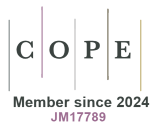Most read articles by the same author(s)
- Giovanni Di Minno, Roberto Ravasio, Cost-effectiveness analysis of caplacizumab in the new standard of care for immune Thrombotic Thrombocytopenic Purpura in Italy , Global and Regional Health Technology Assessment: Vol. 8 No. 1 (2021): January-December 2021
- Andrea Chiricozzi, Antonio Costanzo, Anna Levi, Federica Parretta, Roberto Ravasio, Cost per NNT for upadacitinib in the treatment of patients with moderate-severe atopic dermatitis in Italy , Global and Regional Health Technology Assessment: Vol. 11 No. 1: January-December 2024
- Paolo Gisondi, Francesco Loconsole, Paola Raimondo, Roberto Ravasio, Cost per responder for risankizumab vs secukinumab in patients with moderate-to-severe plaque psoriasis in Italy , Global and Regional Health Technology Assessment: Vol. 8 No. 1 (2021): January-December 2021
- Roberto Ravasio, Antonio Costanzo, Silvia Antonelli, Alessia Maiorino, Serena Losi, Number needed to treat for interleukin inhibitors approved for the treatment of moderate-to-severe plaque psoriasis in Italy , Global and Regional Health Technology Assessment: Vol. 8 No. 1 (2021): January-December 2021
- Roberto Caporali, Roberto Ravasio, Paola Raimondo, Fausto Salaffi, Cost per responder for upadacitinib vs abatacept in patients with moderate-to-severe Rheumatoid Arthritis in Italy , Global and Regional Health Technology Assessment: Vol. 8 No. 1 (2021): January-December 2021
- Flavio Caprioli, Massimo Claudio Fantini, Francesca Marando, Dario Scaduto, Roberto Ravasio, Cost per Number Needed to Treat (NNT) for upadacitinib in the treatment of bio-exposed patients with moderately-severely active ulcerative rectocolitis , Global and Regional Health Technology Assessment: Vol. 11 No. 1: January-December 2024
- Roberto Caporali, Roberto Ravasio, Paola Raimondo, Fausto Salaffi, Erratum in: Cost per responder for upadacitinib vs abatacept in patients with moderate-to-severe Rheumatoid Arthritis in Italy , Global and Regional Health Technology Assessment: Vol. 9 No. 1 (2022): January-December 2022
- Luca Stingeni, Roberto Ravasio, Chiara Palladino, Sara Di Fino, Anna Levi, Gianluca Ronci, Paolo Gisondi, Cost per responder of upadacitinib 30 mg and dupilumab 300 mg in patients with moderate-to-severe atopic dermatitis in italy , Global and Regional Health Technology Assessment: Vol. 12 No. 1 (2025): January-December 2025
- Arianna Bertolani, Roberto Ravasio, Paola Raimondo, Claudio Jommi, The costs incurred by patients to get eligibility to PCSK9 treatment and one-year follow-up: the results of the PRIOR Study , Global and Regional Health Technology Assessment: Vol. 9 No. 1 (2022): January-December 2022
- Roberto Ravasio, Silvia Antonelli, Alessia Maiorino, Antonio Costanzo, Serena Losi, Cost per responder for ixekizumab and other biologic drugs approved for the treatment of moderate-to-severe plaque psoriasis in Italy , Global and Regional Health Technology Assessment: Vol. 6 No. 1 (2019): January-December 2019









